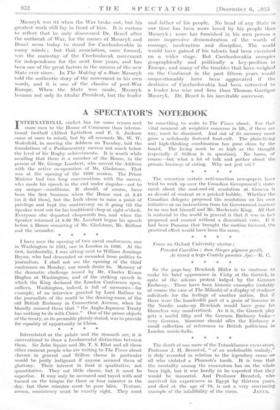Interrelated as the palate and the stomach are, it is
conventional to draw a fundamental distinction between them. Sir John Squire and Mr. T. S. Eliot and all those other eminent people who are writing to The Ti»zes about cheeses in general and Stilton cheese in particular would be justly indignant if anyone accused them of 'gluttony. Their interest in food is qualitative, not quantitative. They eat little cheese, but it must be superfine. It may only be savoured and toyed with and turned on the tongue for three or four minutes in the day, but those minutes must be pure bliss. Texture, aroma, consistency must be exactly right. They must be something to write to The Times about. For that vital moinent all weightier .concerns in life, if there are any, must be dismissed. And out of its memory must grow a sedulously fostered food-cult. The plain-living and high-thinking combination has gone clean by the board. The • living must be as high' as the: thought (especiall3n if . Stilton is in question). No harm, of course—but what a lot of talk and pother about the prosaic business of eating. Why not just eat ?
*












































 Previous page
Previous page